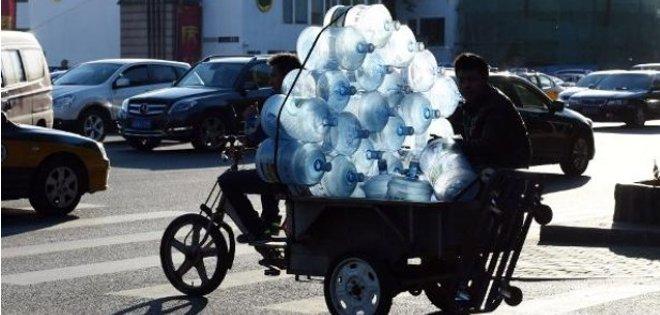22
11/2022
In front of the fire headquarters of the city of Porterville, in California, Pete Rodríguez stuffed from the top of his truck a dozen water cubes of a cistern: he does it with care because another car expects his turn impatient to do the same thing to do the same thing.
Rodríguez is part of the hundred neighbors and merchants from this small town in the Central Valley of California who have no water because of the terrible drought that has been affecting this area of the west of the United States for three years.
"I have two cubes near the bathrooms and another near the shower," Pete explains to the AFP about the hardships that must live in this extreme situation.
Only about 430 of 450.000 people living in Tulare County, to which Porterville belongs, they currently have ordinary water.
"These are unprecedented data in California," the director of the Emergency Management Center in this area, Andrew Lockman, told AFP.
"These people no longer have water to throw the chain of the toilets, to shower, wash their clothes, wash their teeth or cook," adds the emergency coordinator.This situation "really involves a problem for public health".
The private wells that once supplied thousands of houses are dry after years without the rain has fallen enough to feed the water tables.

The drought has also harmed the thousands of agricultural fields of the central valley that have historically given the majority of fruits and legumes to the US market.
In the third world and here
US authorities want to build various centralized distribution networks to solve this problem, but the project, in discussion, requires a high budget and would take several years to complete.
Waiting, emergency services try to cover this situation with the only remedies within their reach: distribute water to those affected.
In front of the Porterville fire hamlet.
"I'm afraid that people get sick" with that water, he explains to the AFP, he is a retired 71 -year -old, who earned a living as a social worker.
Among the main affected are “families with babies and older people who can no longer drive” or load water drums, he adds, while driving his truck.
The problem is that there are "many affected people who are too proud, do not speak English well or do not have the papers in order and do not dare to ask for help," says Donna.She also went through this denial process."It was hard for me to accept it.One is said ‘This only happens in Third World countries’.But it also occurs in the United States, any disaster can occur in the United States, ”he says.
The first stop Donna is at Edy's house, a Mexican mechanic who is preparing to download the water drums."Bathing his 18 -month -old nephew has become something really difficult," says this man.
Not far lives Jessie Coates, a veteran of the Vietnam War concentrated on washing clothes in the courtyard of her house.In a sweeping, remove and turn the garments with the help of a stick, the old way.The dirty dishes wait in another bucket.
Coates has removed the taps of his kitchen, unused for a long time, and has put a drum with water next to the sink."I have my arms shattered from loading the water," complains this man, who wears a shirt with the Patriotic motto "I Love USA".
Donna says that families with greater economic resources also suffer from these hardships.Although they have money to build new wells or systems to stock up, they do not find whoever does the works because there is a waiting list of 18 months.
Given the difficulty of living every day without water, and without perspectives of improvement, Edy considers moving to another place, although at the moment there is no one to buy a house that does not have running water.Pete, on his side, jokes: after bringing so many drums "I have lost this," he says pointing to his belly.

- 504
- How to wash old -fashioned clothes
Related Articles
48 Best Kids Watches in 2021 based on 623 reviews
16/05/2022If you are here, we assume that you are looking for the best watches for children. However, given the number of options available in the market, it becomes really daunting to choose the right product...
46 Best Pitchers and Decanters in 2021: According to the Experts
20/04/2022You can get any random Pitchers and Decanters, but if you're looking for expert advice to choose the best one for your needs, then you've come to the right place. No matter which...
39 Best Legumes in 2021: According to the Experts
02/03/2022You can get any random legume, but if you're looking for expert advice to choose the best one for your needs, then you've come to the right place. No matter what your...
Best Camper Kit For Vans 2022 (buying guide)
03/05/2022Technology improvement need only increase the level of competition in each market. Whether it is automobiles or electronic devices, every industry makes the best use of advanced technology...